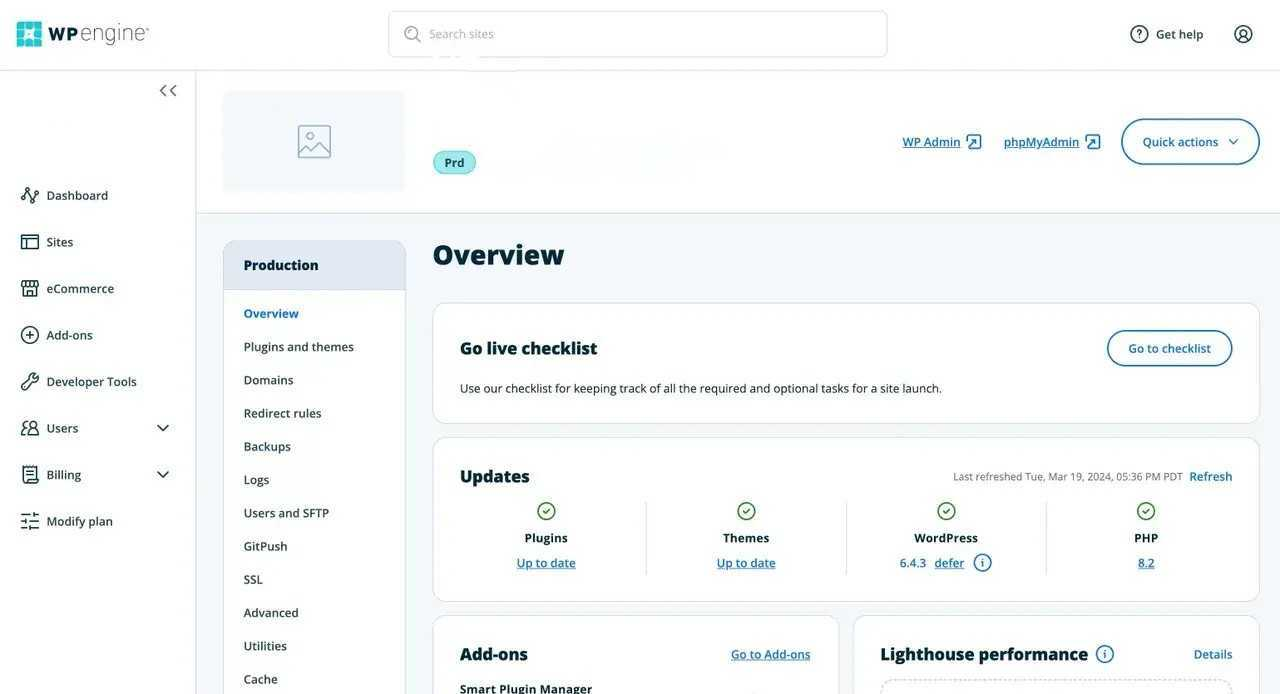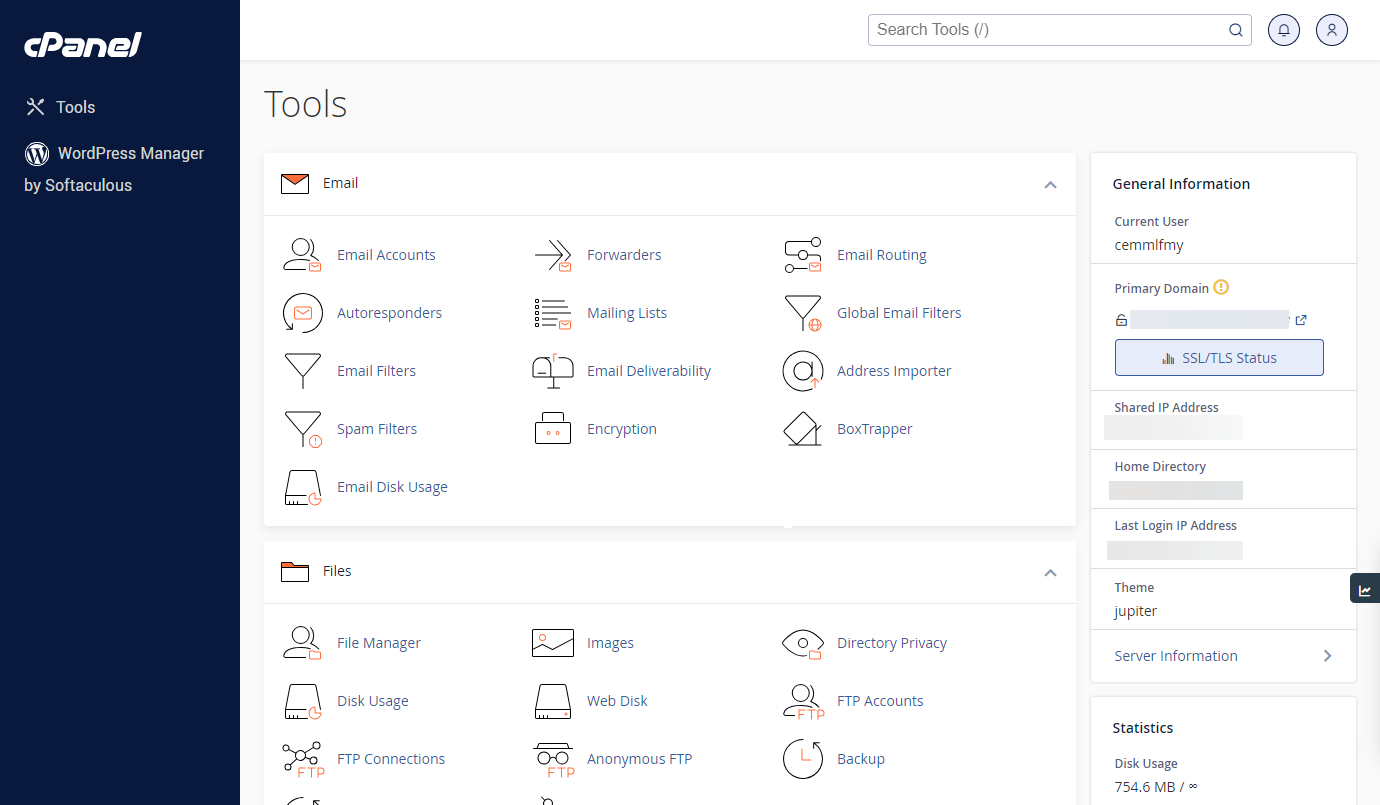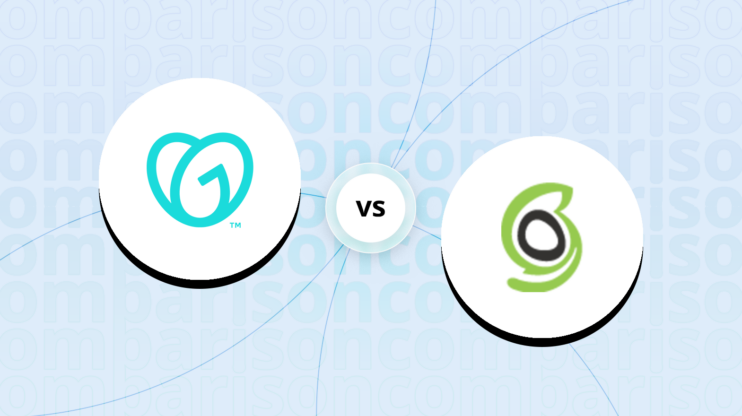Bluehost vs WP Engine: Final verdict
Looking over WP Engine vs. Bluehost, it’s clear why both hosts are so popular. They have both hosted millions of
websites that run on WordPress for decades, building up a loyal customer base.
WP Engine (Overall grade: 8.6)
emphasizes performance and security, ideal for high-traffic WordPress sites and businesses needing robust security measures. Key features include EverCache® technology, automated updates, 24/7 uptime monitoring, and enterprise-grade security with SLA-backed 99.99% uptime. The platform supports developers with advanced tools and ensures fast page load times through its global CDN. However, the higher price point might be a barrier for smaller sites or users needing generic hosting services, and the lack of email hosting requires users to look for external solutions.
Bluehost (Overall grade: 8.2)
provides a variety of hosting options including shared, VPS, and dedicated hosting, offering great flexibility for different needs. With features like free AI site creation tools, free domain registration for the first year, and user-friendly site management, it’s a suitable choice for beginners and small businesses. Bluehost’s performance is reliable with a solid 99.63% uptime, and its extensive customer support options make troubleshooting easier. Nevertheless, some users have voiced concerns over frequent outages and hidden fees, and its performance and security measures fall slightly short when compared to WP Engine, making it less ideal for larger, high-traffic sites.
 Overall grade:8.2 |
 Overall grade:8.6 |
|
|---|---|---|
| Uptime and Availability | 9.0 | 9.6 |
| Hosting Performance | 8.9 | 9.1 |
| Hosting Security | 8.1 | 9.4 |
| Price | 8.1 | 8.1 |
| Hosting Features | 7.0 | 6.8 |
| Ease Of Setup | 8.6 | 8.3 |
| User Management | 8.0 | 8.8 |
| Customer Support | 7.9 | 8.9 |
| User feedback | 3.5/5 | 4.6/5 |
Hosting types offered
Both platforms provide a variety of hosting types, each designed to meet the different needs of users.
 |
 |
|
|---|---|---|
| Shared hosting | ||
| Cloud hosting | ||
| WordPress hosting | ||
| Ecommerce hosting | ||
| VPS hosting | ||
| Dedicated hosting |
Although both offer a variety of hosting plans tailored to different needs, in
certain cases, one platform may prove to be more suitable.
Detailed comparison
Uptime and availability
Evaluates the average uptime statistics, uptime guarantee and overall availability of the hosting
provider
Score Components:
- Uptime percentage (30%): evaluates the uptime statistics in given period of time
- Uptime guarantee (20%): Assesses if the platform offers an uptime guarantee and
whether the actual uptime matches the promised guarantee. - General performance (25%): Evaluates how fast is the average response time and overall
it’s stability. - Responsiveness (10%): Adaptability to different devices and screen sizes.
- Availability (25%): Reflects the total downtime and number of outages.
 9.0
9.0
 9.6
9.6
🏆 Winner: WP Engine: Exceptional uptime monitoring and proactive maintenance.

WP Engine shows a slightly superior performance in terms of reliability and speed. Both hosting services have impressive uptimes, with WP Engine slightly edging out Bluehost with a 99.99% uptime over a 30-day period compared to Bluehost’s 99.63%. This difference in uptime is reflected in the number and duration of outages, where WP Engine experienced proactive security measures and 24/7 uptime monitoring.

WP Engine’s advantage is more pronounced in terms of server response time. It boasted an average response time of 489ms, which is significantly lower than the shared hosting industry standard and faster than Bluehost’s average server response times just under one second. This suggests that WP Engine is not only more reliable in maintaining uptime but also in delivering faster website loading speeds, making it a preferable option for users prioritizing performance.
Which one has better hosting performance?
Score Components:
- Hosting speed (30%): This includes SSD quality, Load times, PageSpeed score ranges,
additional information on website speed, built-in plugins for performance enhancement, available caching
methods, and CPU/RAM options - CDN (20%): Considers whether CDN is available or not, whether it’s free or paid, and
the quality of the CDN service - Available data centers (30%): Evaluates the number of data centers and their locations
globally. - Scalibility (20%): Looks at whether elastic scaling is available, the process required
to scale (manual upgrade vs. automatic scaling), the presence of dedicated servers, and the costs
associated with scaling.
 8.9
8.9
 9.1
9.1
🏆 Winner: WP Engine: Fast and feature-rich managed WordPress hosting.
When it comes to general performance, both Bluehost and WP Engine offer commendable hosting options. Bluehost provides SSD storage across all plans, ensuring quicker access times, while its built-in CDN enhances global speed through image optimization and edge caching. Bluehost also boasts a global data center network. WP Engine, known for its fast page load times, employs EverCache® technology to handle high traffic efficiently. Their fully-managed CDN with over 200 points of presence ensures fast global delivery. Data centers are spread across key regions, providing low latency for international users.
Website speed
Bluehost delivers top-tier speed for WordPress sites with its SSD storage and optimized infrastructure, increasing CPU frequency for better performance. On the other hand, WP Engine leverages EverCache® and the latest PHP versions to improve speed and handle numerous requests per second. WP Engine’s optimization for Core Web Vitals and comprehensive real-time monitoring ensures consistently fast load times, critical for both user experience and SEO.
Scalability
Bluehost offers various hosting plans, including dedicated servers, to scale resources, and the process involves upgrading to higher plans. With WP Engine, scalability is built into its architecture, handling traffic spikes efficiently without manual upgrades. The isolated resources ensure stable performance, but specific details about the costs to scale were not provided.
Which one has better security features?
and regulatory requirements
Score Components:
- Technical security measures (40%): This includes encryption, firewalls, DDoS
protection, secure configurations, server monitoring, access control and availability of security addons
(e.g Sitelock security). - Operational security measures (30%): Encompasses data privacy, backups and data
redundancy. - Compliance and certifications (20%): Adherence to legal and regulatory requirements
(e.g., GDPR, HIPAA) and possession of certifications (e.g., ISO 27001, SOC 2). - Business and reliability (10%): Factors in the provider’s reputation, uptime
guarantees, and customer support.
 8.1
8.1
 9.4
9.4
🏆 Winner
WP Engine: Provides a superior security experience with enterprise-grade protection and extensive compliance certifications.
Both Bluehost and WP Engine, have notable differences in their approaches to technical and operational
security, as well as in their compliance with regulations.
Technical security measures:
Bluehost offers a range of technical security features, including free and premium SSL certificates, automated daily backups, DDoS protection, a Web Application Firewall (WAF), two-factor authentication, malware scanning, and traffic encryption. WP Engine, on the other hand, provides enterprise-grade technology with automated threat detection, continuous monitoring, Cloudflare CDN, and global edge security. WP Engine’s advanced DDoS mitigation and Argo Smart Routing enhance the protection against website vulnerabilities and security threats, making its technical security measures more robust.
Operational security measures:
Bluehost ensures operational security with measures like daily automated backups, managed updates, and a Web Application Firewall (WAF). Email security options, automated WordPress updates, and real-time anti-phishing are part of Bluehost’s approach. WP Engine’s operational security encompasses always-on monitoring, proactive threat detection, live security management, and automated plugin/theme updates. WP Engine’s 24/7 global support with a high satisfaction rate ensures continuous operation with minimal security interruptions. Hence, WP Engine’s operational security is more comprehensive.
Compliance and certifications:
Bluehost complies with GDPR, explaining data collection and usage clearly through its Privacy Center. It doesn’t support PCI compliance on shared hosting but does on VPS and dedicated servers. WP Engine boasts strict adherence to compliance standards, including SOC-2 and ISO 27001-2013 certifications, indicating its commitment to high security and availability. Though it provides PCI compliance, the results might vary due to customized components. WP Engine’s multi-layered compliance demonstrates a higher level of security governance.
 |
 |
|
|---|---|---|
SSL certificate |
Free SSL (Let’s Encrypt); Premium SSL (Comodo) |
Free SSL certificates |
Additional security features |
DDoS protection, WAF, malware scanning, automated updates, WordPress updates, traffic encryption, spam filter, real-time anti-phishing, safe unsubscribe, file encryption |
DDoS mitigation, WAF, edge security, Argo Smart Routing, proactive security alerts, domain reporting, plugin/theme updates |
PHP versions |
PHP Workers on Cloud plans |
Not specified |
GDPR compliance |
Yes |
Not specified |
HIPAA compliance |
Not specified |
Not specified |
PCI compliance |
Only for VPS and dedicated servers |
Yes, but results may vary |
Hosting features
Score Components:
- Domains (20%): Assesses the availability of a free domain, domain purchase options, and
pricing - Email (15%): Considers if the provider offers full email hosting, or is reselling
third-party service, and if the email is only transactional or not - Website builder (15%): Checks if website builder is available, and it’s user
friendliness and overall the level of customization allowed. - Staging environment (20%): Determines if a staging environment is available, allowing
for testing changes before going live. - FTP & SFTP accounts (10%): Evaluates if and how easily users can access FTP and
SFTP accounts - Git and SSH access (20%): Assess whether Git is integrated into the hosting service and
if SSH access is provided
 7.0
7.0
 6.8
6.8
🏆 Winner:
Bluehost: A great choice for various hosting needs with extensive features and flexibility.
Both Bluehost and WP Engine offer a range of hosting options tailored to different user requirements. Bluehost provides various plans from shared to dedicated hosting, including specialized WordPress hosting, making it versatile for different needs. It comes with user-friendly site creation tools, including free AI site creation and free AI help, easing the process for beginners. The inclusion of free domain registration for the first year and one-click WordPress installation stands out, but there are charges if you cancel and wish to retain your domain. Its free CDN and SSL options are good for securing and speeding up websites. Bluehost also offers a WooCommerce hosting plan with specific e-commerce functionalities, which could be appealing for those looking to run a store.
WP Engine, renowned for its managed WordPress hosting, emphasizes performance and security, catering especially to businesses and high-traffic sites. Features like EverCache® technology and Global Edge Security provide robust performance and protection. WP Engine’s automated migration plugin simplifies the process for existing WordPress users, and its development tools, including Local WordPress Development and WPGraphQL, are a boon for developers. The inclusion of 10 premium WordPress themes adds value for those seeking high-quality designs. Though it doesn’t offer a free domain like Bluehost, WP Engine’s SLAs and end-to-end management make it impressive for mission-critical sites.
 |
 |
|
|---|---|---|
Free domain |
Yes, for the first year |
No |
Free SSL |
Yes |
Yes |
Email hosting |
Yes, via Google Workspace |
No |
Website builder |
Free AI Site Creation |
No |
Staging environment |
No |
Yes |
FTP & SFTP accounts |
Yes |
Yes |
Git and SSH access |
No |
Yes |
Free backup |
Yes, for the first year |
Yes |
Money back guarantee |
Yes, conditions apply |
No |
a location.
As a result in rare cases the features mentioned here can differ from the ones you see on their websites.
Both providers support a range of users from beginners to experts with user-friendly website builders and WordPress staging areas. However, in terms of developer tools, both Bluehost and WP Engine offer robust options including SSH access, support for multiple programming languages, and Git for version control, thus appealing to developers looking for advanced capabilities.
Email services:
Bluehost offers professional email hosting through Google Workspace, making it convenient for users to manage their email campaigns and business communications. This is in addition to hosting capabilities that support transactional emails for actions such as form submissions. WP Engine, on the other hand, does not offer its own email hosting services, focusing instead on its core strength of managed WordPress hosting. This can be a drawback for users needing integrated email services as they would need to look for third-party solutions.
Price
Score Components:
- Plan value (40%): What each pricing tier offers.
- Transparency and clarity (30%): Clearness of pricing structures.
- Flexibility of plans (20%): Range of options to suit different budgets.
- Hidden costs (10%): Additional expenses not included in the plan.
 8.1
8.1
 8.1
8.1
🏆 Winner
WP Engine: Superior managed WordPress hosting with a strong focus on performance and support.
Evaluating the pricing of plans among various hosting providers can be complex due to their differing pricing and renewal strategies. Additionally, certain plans require annual commitments, which adds to the difficulty of making comparisons. The prices listed are based on monthly commitments; plans requiring annual commitments are indicated. Additionally, although some providers offer identical plans for WordPress and shared hosting, we have created separate tables for each to enhance clarity.
Bluehost offers a diverse range of hosting plans including shared, VPS, dedicated, cloud, and WooCommerce hosting. Their shared hosting plans start as low as $10.99 monthly with key features like free CDN, SSL, and daily backups. WP Engine specializes in managed WordPress hosting with plans beginning at $20 monthly, offering enhanced security, automated backups, and premium themes. Bluehost’s shared hosting plans are feature-rich, but WP Engine’s managed WordPress plans offer superior performance and support tailored for WordPress sites, making it the preferred choice for businesses focused on their WordPress ecosystem.
 |
 |
|---|---|
|
Online Store $26.99
1 website, 100 GB storage, free domain 1st year, free SSL, professional email, Yoast SEO, daily backups, secure payments, unlimited products Value for price:8.0
|
Startup Plan $20
1 site, 10 GB storage, 50 GB bandwidth, chat support, auto-renewing SSL, SSH access, security scans, automated backups, EverCache, global CDN Value for price:9.0
|
|
Online Store + Marketplace $29.99
All features of Online Store plan with additional multi-marketplace tools Value for price:8.0
|
Professional Plan $40
3 sites, 15 GB storage, 125 GB bandwidth, chat & phone support, auto-renewing SSL, SSH access, security scans, automated backups, EverCache, global CDN Value for price:8.5
|
|
N/A
|
Growth Plan $77
10 sites, 20 GB storage, 200 GB bandwidth, priority support, auto-renewing SSL, SSH access, security scans, automated backups, EverCache, global CDN Value for price:8.0
|
|
N/A
|
Scale Plan $194
30 sites, 50 GB storage, 500 GB bandwidth, priority support, auto-renewing SSL, SSH access, security scans, automated backups, EverCache, global CDN Value for price:7.5
|
|
N/A
|
Custom Plan $600
Contact sales for details. Includes advanced features like DDoS protection, application monitoring, multisite add-on, dedicated account manager Value for price:Varies
|
 |
 |
|---|---|
|
Basic $10.99
1 website, 10 GB storage, free CDN, free SSL 1st year, free domain 1st year, chat support, AI tools, malware scanning, daily backups Value for price:8.0
|
N/A
|
|
Plus $14.99
Unlimited websites, unmetered storage, free CDN, free SSL 1st year, free domain 1st year, chat support, AI tools, malware scanning, daily backups Value for price:8.5
|
N/A
|
|
Choice Plus $18.99
Unlimited websites, unmetered storage, free CDN, free SSL 1st year, free domain 1st year, chat support, AI tools, malware scanning, daily backups Value for price:8.5
|
N/A
|
|
Pro $28.99
Unlimited websites, unmetered storage, free CDN, free SSL 1st year, free domain 1st year, chat support, AI tools, malware scanning, daily backups, optimized for high traffic Value for price:8.0
|
N/A
|
 |
 |
|---|---|
|
Cloud 1 $79.99
1 website, 10 GB storage, 2 vCPU, 100% uptime, 24/7 priority support Value for price:7.0
|
N/A
|
|
Cloud 10 $109.99
10 websites, 125 GB storage, 20 vCPU, 100% uptime, 24/7 priority support Value for price:7.5
|
N/A
|
|
Cloud 25 $169.99
25 websites, 175 GB storage, 75 vCPU, 100% uptime, 24/7 priority support Value for price:8.0
|
N/A
|
|
Cloud 50 $249.99
50 websites, 225 GB storage, 150 vCPU, 100% uptime, 24/7 priority support Value for price:8.5
|
N/A
|
Enterprise plans
For enterprises, Bluehost offers dedicated hosting with pricing starting at $119.99 monthly, including features such as 16 GB RAM, 4 Core CPU, and 15 TB bandwidth. Meanwhile, WP Engine’s Custom Plan starts at $600 monthly, with advanced features like DDoS protection, application monitoring, and a dedicated account manager. WP Engine’s enterprise plans are geared towards large-scale operations requiring specialized support and enhanced security features, making them suitable for high-demand enterprise environments.
Bluehost vs WP Engine: Ease of setup
platform.
Score Components:
- Site migration (25%): Assesses whether the provider offers tools for site migration,
either automated or manual, and whether these services are free or require a fee. - Admin panel usability (35%): Evaluates the type of admin panel provided, such as the
standard cPanel or a custom solution, focusing on its accessibility and user-friendliness for both
technical and non-technical users. - Setup features (20%): Examines the availability and ease of use of various setup
features, including FTP accounts, file managers, email account setup, PHPMyAdmin, and easy CDN
configuration. - Help center quality (20%): Measures the quality and accessibility of the provider’s
help center resources, including articles and tutorials.
 8.6
8.6
 8.3
8.3
🏆 Winner Bluehost: A user-friendly hosting provider with advanced AI tools and a guided setup process.
Bluehost and WP Engine offer different experiences when it comes to their admin panels. Bluehost provides a custom admin panel that integrates seamlessly with their AI WonderSuite tools. This panel is designed to be intuitive for both technical users and beginners, featuring a guided setup process that simplifies website creation and management. Users can quickly access WordPress features, manage their websites, and use the simplified setup wizard for building online stores. The interface is clean and straightforward, helping users navigate their tasks efficiently.

On the other hand, WP Engine employs a custom user portal designed for WordPress hosting. This admin panel focuses on offering advanced functionality and developer tools, such as Git Push and an SSH Gateway setup. While it might be more complex for non-technical users, it provides powerful options for site performance, security settings, and detailed analytics. WP Engine’s panel aims to cater to developers and those needing advanced features, thus maintaining a balance between user-friendliness and technical sophistication.

Regarding migration tools, Bluehost focuses on a simple onboarding and setup with automatic WordPress installation right from the start. Their AI tools facilitate a hassle-free experience, making it easy for users to get their site up and running quickly. Meanwhile, WP Engine offers a free Automated Migration plugin that simplifies the process for users who need to migrate existing WordPress sites. They also offer manual migration guides and 24/7 support to assist users through the process. Both services provide free migration tools, but WP Engine’s specialized plugin offers a slight edge for existing WordPress users looking for an easy transition.
Both Bluehost and WP Engine offer comprehensive help centers with extensive articles, guides, and video tutorials. Bluehost’s knowledge base covers a broad range of topics, including detailed instructions for WordPress, plugins, themes, and troubleshooting. Users can access 24/7 support via chat, phone, and email. WP Engine also provides a robust support center with detailed migration guides, platform settings, and developer tools. Their support team is available 24/7 via chat and phone for technical assistance. Each provider ensures that users have access to in-depth resources to manage their websites effectively.
The platforms provide extensive knowledge bases filled with guides, how-to articles, and instructional content. Bluehost offers a wide range of resources alongside 24/7 chat and phone support. WP Engine also boasts a detailed help center with an intuitive search function and around-the-clock support via live chat, phone, and ticketing, ensuring comprehensive user support.
User management
accessibility.
Score Components:
- Role customization (40%): Flexibility in creating and defining user roles and
permissions. - Ease of management (30%): User interface and tools for managing users.
- Access control (20%): Effectiveness of access control measures for different user
levels. - Scalability (10%): Ability to manage a growing number of users efficiently.
 8.0
8.0
 8.8
8.8
🏆 Winner WP Engine: Superior flexibility and detailed user role management for high-level account control.
When comparing the user management capabilities of Bluehost and WP Engine, WP Engine stands out due to its detailed role system and granular access controls. Bluehost offers three main user roles—Primary Contact, Admin Contact, and Tech Contact—each with a distinctive set of permissions tailored to specific responsibilities. However, WP Engine provides a more nuanced approach with its Owner, Full (with/without billing), and Partial (with/without billing) roles, allowing for more precise user role definition and segmented access. This flexibility makes WP Engine more adaptable for diverse user needs and organizational structures.
In terms of user interfaces and tools provided for managing users, Bluehost offers a straightforward process for adding, editing, and removing users through its Account Manager. Users can easily be invited and assigned roles via email. WP Engine also provides a user-friendly experience through its User Portal, featuring detailed steps for inviting and managing users. The inclusion of environment-based role assignments in WP Engine adds a layer of customization that Bluehost lacks, making WP Engine’s interface more versatile for complex setups.
Assessing the effectiveness of access control measures, WP Engine demonstrates superior capabilities, especially in environments that require comprehensive user differentiation. Its detailed role management, combined with an activity log that tracks critical changes and user actions, supports effective access control and monitoring. Bluehost offers a solid foundation but lacks the granular control and advanced tracking features required for high-demand environments. Consequently, WP Engine is better equipped to manage a growing number of users efficiently and securely.
Bluehost user roles table:
| Role | Description | Access Highlights |
|---|---|---|
| Primary Contact | Main account holder and decision-maker. | Full access to account management, payment information, user roles, product purchases, domain WHOIS information. |
| Admin Contact | Manages settings and permissions, excluding Primary Contact tasks. | Access to payment information, user roles, product purchases, and domain WHOIS Admin and Tech information. |
| Tech Contact | Focus on technical configurations and troubleshooting. | Manages products/services, renewals, and domain WHOIS Admin and Tech information. |
WP Engine user roles table:
| Role | Description | Access Highlights |
|---|---|---|
| Owner | Full administrative control over the account. | Can delete/move sites, close accounts, remove users, and manage billing/transferable sites. |
| Full (with billing) | Wide-ranging access with billing permissions. | Can purchase add-ons, manage Smart Plugin Manager, and initiate/accept transferable sites, but cannot delete users. |
| Full (without billing) | Broad access without billing capabilities. | Can manage environments and Smart Plugin Manager settings, but cannot perform billing actions or initiate transfers. |
| Partial (with billing) | Limited to selected environments with billing access. | Can manage selected environments, make billing changes, and copy/restore environments they have access to. |
| Partial (without billing) | Limited to selected environments without billing access. | Can copy/restore in designated environments, but cannot create/delete sites or manage billing and Smart Plugin Manager settings. |
Customer support
hosting provider.
Score Components:
- Support communication channels (30%): Measures the variety of customer support types
provided (live chat, chatbot, email, phone, etc.) - Availability (20%): Assesses the availability hours for each channel, including 24/7
support options. - Technical support quality (30%): Assesses whether the provider offers comprehensive
technical support, including hardware upgrades (e.g., HDD to SSD), software installations, and web
server configuration changes. - Enterprise support (20%): Checks if there are dedicated or priority support services
for enterprise-level customers.
 7.9
7.9
 8.9
8.9
🏆 Winner
WP Engine: WP Engine demonstrates higher customer satisfaction and offers advanced support features.
 |
 |
|
|---|---|---|
Phone support |
||
Live chat support |
||
Chatbot |
||
Email/ticket support |
||
Enterprise support (dedicated agent, priority support) |
When comparing Bluehost and WP Engine, both provide extensive customer support options, but WP Engine stands out with its higher customer satisfaction and advanced features. WP Engine offers 24/7 support via phone and live chat, while Bluehost also provides 24/7 support through live chat and limited phone support hours. Both companies have comprehensive knowledge bases, but WP Engine has additional premium support options, giving access to experienced staff for those who opt for higher-tier plans.
WP Engine provides specialized tools, such as access to PHP/Apache error logs, and enhanced security features, including DDoS protection and managed WAF. Bluehost has eliminated ticket-based support in favor of live chat and phone support, offering expedited support for dedicated hosting issues and multi-server management. WP Engine further impresses with a 60-day money-back guarantee, compared to Bluehost’s 30-day policy. Overall, WP Engine’s combination of specialized tools, security features, and higher customer satisfaction sets it apart.
Bluehost vs WP Engine: User feedback
User feedback on Bluehost as a hosting provider is highly mixed. On the positive side, many users commend their affordable pricing, ease of use with WordPress integration, and the comprehensive range of features such as free domain names, SSL, and excellent customer support. However, numerous reviews criticize the service for frequent outages, technical support issues, hidden fees, and unreliable performance, which have significantly impacted users’ businesses. Additionally, complaints about complicated navigation, aggressive upselling, and a steep learning curve for first-time users are common. While some users find Bluehost reliable and cost-effective, others have had severely negative experiences, citing problems like non-functional websites, billing issues, and inadequate customer service.
WP Engine exudes excellence in managed WordPress hosting, boasting top-notch technical support that’s often highlighted as a standout feature. Users appreciate the user-friendly dashboard, seamless migration tools, daily backups, and solid security measures, all of which contribute to high performance and reliability. However, the service does come at a higher price point, which some users find steep, especially for entry-level plans or smaller projects. Despite occasional concerns about costs and some technical nuances, WP Engine’s premium service quality justifies the expense for many, making it a highly recommended solution for businesses and developers alike.
Bluehost vs WP Engine: FAQ
Which platform is better suited for hosting WordPress websites?
WP Engine is better suited for hosting WordPress websites due to its specialized features, such as EverCache® technology, automated updates, and a robust CDN. It focuses on performance and security tailored specifically for WordPress. Although Bluehost also offers WordPress hosting with useful features, WP Engine’s optimizations and developer tools make it the superior choice for WordPress users.
Which hosting service offers better security features?
WP Engine offers superior security features with enterprise-grade protection including automated threat detection, continuous monitoring, advanced DDoS mitigation, and Cloudflare CDN integration. In contrast, Bluehost provides solid security measures like SSL certificates, DDoS protection, and malware scanning, but falls short of WP Engine’s extensive measures. Therefore, WP Engine’s security framework is more comprehensive and robust.
What are the major differences in pricing and value between Bluehost and WP Engine?
Bluehost offers a variety of affordable hosting plans starting as low as $10.99 per month for shared hosting, with features like free CDN, SSL, and daily backups. WP Engine, specializing in managed WordPress hosting, starts at $20 per month, providing enhanced security, automated backups, and premium themes. While Bluehost is cost-effective with broad feature sets, WP Engine’s higher pricing is justified by its superior performance and WordPress-specific optimizations.
Which platform offers better customer support?
WP Engine offers better customer support with higher customer satisfaction ratings, providing 24/7 support via phone and live chat, along with premium support options for higher-tier plans. Bluehost also provides 24/7 support through live chat and limited phone support, but user feedback indicates occasional issues with response times and support quality. Therefore, WP Engine’s advanced support features and high satisfaction rates make it superior.
How do the providers handle email hosting and what features are included?
Bluehost offers professional email hosting through Google Workspace, which allows users to manage business communications and email campaigns effectively. Additionally, it supports transactional emails linked to hosting actions. WP Engine does not provide email hosting services, focusing solely on managed WordPress hosting. As a result, WP Engine users need to seek third-party email solutions, making Bluehost more convenient for integrated email hosting.
The making of this blog
We followed a clear, step-by-step process to write and research this article.









